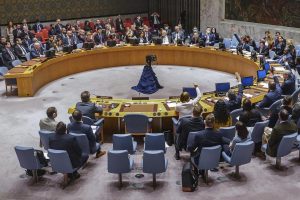UNSC to hold closed consultations on Indo-Pak situation today

United Nations: The UN Security Council will hold closed consultations Monday on the situation between India and Pakistan after Islamabad sought an emergency meeting amid tensions between the two nations following the Pahalgam terror attack.
Pakistan currently sits as a non-permanent member of the powerful 15-nation Security Council, which is being presided over by Greece for the month of May.
Islamabad “requested closed consultations” on the tensions between the two countries and the Greek Presidency has scheduled the meeting for May 5 in the afternoon.
Apart from the five veto-wielding permanent members — China, France, Russia, the UK and the US — the 10 non-permanent members in the Council are Algeria, Denmark, Greece, Guyana, Pakistan, Panama, South Korea, Sierra Leone, Slovenia and Somalia.
Amid rising tensions between the nuclear-armed South Asian neighbours following the April 22 Pahalgam terror attack, Permanent Representative of Greece to the United Nations and President of the Security Council for the month of May Ambassador Evangelos Sekeris had last week said that if a request comes for a meeting to discuss the situation between India and Pakistan.
“As I said before, as a position of principle, we strongly condemn any act of terrorism and this is what we did” on the “heinous terrorist attack” that took place in Pahalgam in which innocent civilians died, Sekeris had said.
In the weeks following the Pahalgam terror attack in Jammu and Kashmir in which 26 civilians were killed, External Affairs Minister S Jaishankar spoke with all Council members, with the exception of China and Pakistan.
In his calls, Jaishankar underlined that “its perpetrators, backers and planners must be brought to justice.”
He also spoke with UN Secretary-General Antonio Guterres, Russian Foreign Minister Sergey Lavrov, US Secretary of State Marco Rubio, UK Foreign Secretary David Lammy, French Foreign Minister Jean-Noel Barrot and South Korean Foreign Minister Cho Tae-yul, among others.
Last Friday, Pakistan’s Permanent Representative to the United Nations, Ambassador Asim Iftikhar Ahmad said at a press conference at the UN that his country has the right to convene a meeting when “we feel appropriate”.
“We see that all of this that is happening is in the context, in the backdrop of the situation in Jammu and Kashmir,” Ahmad had said.
He said that the situation that evolved after the attack is a real threat to regional and international peace and security.
The Pakistani envoy had last week met Guterres and briefed him about the security situation in the region.
Ties between the two neighbouring countries plummeted following the April 22 attack that killed 26 people, mostly tourists.
India announced a raft of punitive measures against Pakistan, including suspension of the Indus Waters Treaty, shutting down of the only operation land border crossing at Attari and downgrading of diplomatic ties following the terror attack.
Prime Minister Narendra Modi said India is committed to taking “firm and decisive” action against terrorists and their backers.
PM Modi also told the top defence brass that the armed forces have “complete operational freedom” to decide on the mode, targets and timing of India’s response to the attack.
PTI
News